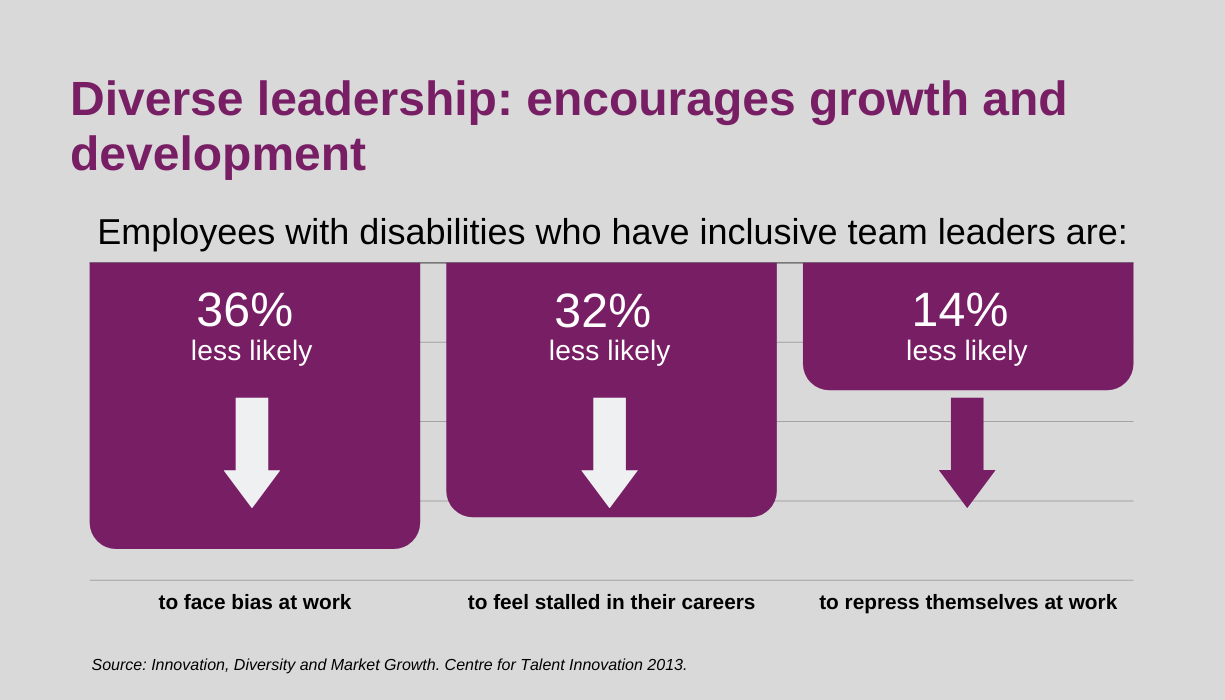Event wrap
Towards inclusive growth: enabling career progression for employees with disability to vitalise organisational success

Image: a person working in a laboratory.
The benefits of employing people with disability are clear.
Research shows people with disability are more productive, have a better safety record, are more reliable, and are also more cost-effective to employ1.
Australian employers progressively realise the benefits of tapping into the diverse skills and experiences that people with disability have to offer, and as such, are taking steps to remove any barriers in the recruitment and on-boarding process.
However, for many organisations, this does not necessarily translate into enabling opportunities when it comes to career advancement and leadership for employees with disability.
Barriers to advancement can eventually create a vacuum in productivity and leadership, where employers are at the risk of under-utilising the potential of employees with disability.
Moreover, employers miss out on incorporating diverse perspectives that can be valuable to the company’s decision-making and ongoing practices.
To address some of the challenges people with disability face when it comes to career progression, JobAccess organised a series of webinars in September and October 2020 for employer alumni partners of the National Disability Recruitment Coordinator (NDRC).
Over 40 employees representing more than 25 public and private-sector organisations joined the online events to hear practical strategies to support and enhance the skills, talents and professional aspirations of employees with disability.
Room for disability representation in leadership positions
JobAccess General Manager, Daniel Valiente-Riedl, said “The growing appetite for diversity in boardrooms and C-Suite positions across larger organisations is evident.
This change is a step in the right direction as research shows the impact diverse employees have on innovation, productivity and problem-solving.”
However, he advised by leaving employees with disability out of consideration for management and leadership roles, employers are missing important viewpoints that can enrich decision making, financial performance, and workplace culture.
Over 60% of working-age Australians with disability experience one or more types of employment restrictions in the workplace. These include ‘being restricted in the type of job’ and difficulty in changing jobs or getting a preferred job2.
“For change to happen, employers must recognise that people with disability may have aspirations and career goals. Moreover, they should ensure employees with disability have the same opportunity as others to participate in career development programs,” Daniel added.

Image: graph showing that employees with disabilities who have inclusive team leaders are less likely to face bias at work, feel stalled in their careers and repress themselves at work3.
An enterprise-wide initiative
Enabling systemic, operational and attitudinal change is an enterprise-wide initiative that can be effective with commitment from senior leadership.
Daniel said, “Such commitment can help challenge mindsets that create barriers in the workplace, and support employees with disability in their professional aspirations.
Leaders have the power to make disability inclusion a priority by holding the organisation accountable for achieving diversity and inclusion goals.”
Beyond setting good practice policies, hiring goals, and performance metrics on disability inclusion, employers can focus on other areas including improving accessibility.
“Accessibility is all about removing barriers so that everyone has equitable access. It positively impacts every facet of life for people with disability, including employment. Some people with disability may require adjustments to perform the inherent requirements of their job,” Daniel explained.
If the employer is aware of an employee’s disability, legally, they must provide what is regarded as ‘reasonable adjustment’ to accommodate the needs of the employee to do their job.
The employer may get financial assistance to cover the cost of making reasonable workplace adjustments through the Australian Government’s Employment Assistance Fund (EAF).
Employers can consider offering or re-assessing workplace adjustments when an employee’s role and responsibilities change, so they can pursue new opportunities.
Promoting internal roles is another way to encourage career development for employees with disability.
“As with external job advertisements, include a diversity and inclusion statement that encourage employees with disability to apply for internal roles.
Avoid skills, experiences, educational degrees, and levels of seniority that may not be necessary for success in the role. Instead, focus on performance objectives, what a person needs to be able to do and achieve in that position so you can attract candidates with diverse backgrounds and skillsets,” Daniel said.
Make it happen in the workplace
In conclusion, Daniel shared how employers can work towards ensuring equitable access to career development opportunities.
“For disability inclusion efforts to succeed, you need to cultivate an environment that goes beyond ensuring the presence of employees with disability in the workplace. Their skills, experiences and perspectives need to be embraced.
Your commitment to disability inclusion should foster transparency about disability in the workplace, so it is safe for people to share information without negative consequences – whether during an interview or in the boardroom.”
Another strategy for employers is to identify why disability inclusion is vital for their organisation and create a business case that demonstrates the value of encouraging a diverse and inclusive workforce.
Daniel said, “Illustrate how people with disability can boost performance in your organisation, and outline the steps you'll take to support them across all levels of employment.”
For more information on how to support employees with disability in the workplace, contact JobAccess on 1800 464 800 to speak with a friendly JobAccess Adviser.
The JobAccess Employer Engagement team (NDRC) works with larger employers through free 12-month partnerships, with the intent of improving an organisation’s disability confidence by removing any attitudinal, systemic and operational barriers in the workplace.
The NDRC offers practical advice, tips and strategies employers can implement to support people with disability through all stages of the employment lifecycle – from recruitment to retention and career advancement.
***
Sources:
1Graffam J, Shinkfield A, Smith K and Polzin, U 2002, Employer benefits and costs of employing a person with a disability. Journal of Vocational Rehabilitation, vol. 17, no. 4, p. 251-263; Australian Safety and Compensation Council, 2007. Are People with Disability at Risk at Work? A Review of the Evidence, ASSC, Canberra, Du Paul University 2007; People with disabilities: A new model of productive labor: https://scholars.unh.edu/cgi/viewcontent.cgi?referer=&httpsredir=1&artic...
2People with disability in Australia. Australian Institute of Health and Welfare. Sept 2019
3Innovation, Diversity and Market Growth. Centre for Talent Innovation 2013. https://www.talentinnovation.org/_private/assets/IDMG-ExecSummFINAL-CTI.pdf.
Last updated:
